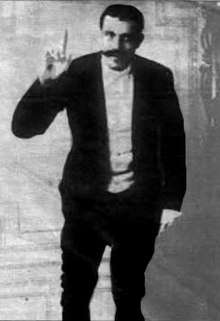Flatulist

A flatulist, fartist, or professional farter is an entertainer (sometimes considered a comedian) whose routine consists solely or primarily of passing gas in a creative, musical, or amusing manner.[1]
History
There are a number of scattered references to ancient and medieval flatulists, who could produce various rhythms and pitches with their intestinal wind. Saint Augustine in City of God (De Civitate Dei) (14.24) mentions some performers who did have "such command of their bowels, that they can break wind continuously at will, so as to produce the effect of singing." Juan Luis Vives, in his 1522 commentary to Augustine's work, testifies to having himself witnessed such a feat, a remark referenced by Michel de Montaigne in an essay.
The professional farters of medieval Ireland were called braigetoír. They are listed together with other performers and musicians in the 12th century Tech Midchúarda, a diagram of the banqueting hall of Tara. As entertainers, these braigetoir ranked at the lower end of a scale headed by bards, fili, and harpers.[2][3]
One late medieval flatulist is mentioned in an entry in the 13th-century English Liber Feodorum or Book of Fees. It lists one Roland the Farter, who held Hemingstone manor in the county of Suffolk, for which he was obliged to perform "Unum saltum et siffletum et unum bumbulum" (one jump, one whistle, and one fart) annually at the court of King Henry II every Christmas. The Activa Vita character in the 14th century allegorical poem Piers Plowman appears to number farting among the abilities desirable in a good entertainer in general, alongside storytelling, fiddling, or playing the harp.[4] This poem translates to "As for me, I can neither drum nor trumpet, nor tell jokes, nor fart amusingly at parties, nor play the harp."
In Japan, during the Edo period, flatulists were known as "heppiri otoko" (放屁男), lit. "farting men."[5]
Popular culture
- Terrance and Phillip, from the animated series South Park, are fictional comedic flatulists.
- Peräsmies, featured in the Pahkasika magazine, is a superhero whose only superpower is the ability to fart supernaturally hard, similar to Fartman (Howard Stern).
- The characters Le Corbusier et Papin on The Smell of Reeves and Mortimer.
- An episode of the sketch comedy series Mr. Show features two fictional flatulists named Fartin' Gary and Fartin' Rudy. In the sketch, Rudy steals a comedy show from professional Fartin' Gary, a professional comedic flatulist. Rudy then earns the title of "Crown Prince of Fartistry" and his talents win him a starring role in his own television sitcom entitled Second Wind.
- The male lead Paulino in the Spanish play ¡Ay Carmela! by José Sanchis Sinisterra (1987), and in the movie of the same name based on it (1990), performs as a flatulist in the work.
- In the 1999 film Mystery Men, Paul Reubens plays The Spleen. Cursed, The Spleen can aim his super-powered flatulence to take out his targets, but he smells terrible at all times.
- On the 1977 comedy album Derek and Clive Come Again, Dudley Moore posed as a professional farter from Scotland called Ross McPharter on a mock Scottish radio show hosted by a character played by Peter Cook.
- Radio shock jock Howard Stern appeared at the 1992 MTV Video Music Awards as Fartman, a fictional superhero who fights crime and can fly thanks to his super-powered flatulence. The Fartman character first appeared in the National Lampoon humor magazine series in the mid-1970s.
- In the manga/anime series One Piece, there is a new character named "Kin'emon" who was introduced with his body cut into three segments, one of which being his lower-half which was the first to be encountered by the main protagonists. During that time he was able to communicate via flatulence.
- Johnny Fartpants from Viz occasionally performs as a flatulist; however, he generally employs his rectal capacity as a superhero.
Notable flatulists
- Mr. Methane, contemporary flatulist
- Le Pétomane, performed in France from 1887 until 1914
- Roland the Farter, flatulist in the court of King Henry II of England.
- Will the Farter, of Howard Stern Show fame, 2007-8.[6]
References
Notes
- ↑ Le Pétomane:The Strange Life of a "Fartiste"
- ↑ Collinson, Francis M. (1975). The bagpipe: the history of a musical instrument. Routledge. p. 73. ISBN 0-7100-7913-3.
- ↑ Fletcher, Alan John (2001). Drama and the performing arts in pre-Cromwellian Ireland: a repertory of sources and documents from the earliest times until c. 1642. Boydell & Brewer. p. 468. ISBN 0-85991-573-5.
- ↑ Peter Meredith, "The professional travelling players of the fifteenth century: myth or reality?" Archived 2012-07-14 at Archive.is European Medieval Drama 2 (1998) 21-34. DOI 10.1484/J.EMD.2.300900
- ↑ "放屁男". Nihon Kokugo Daijiten (日本国語大辞典). Shogakukan.
- ↑ IMDb. "Will The Farter - IMDb Info Page". IMDb. Retrieved 12 August 2018.
Further reading
- Valerie J. Allen; Broken Air Exemplaria (2004). ( PDF version)
- Jim Dawson; Who Cut the Cheese?: A Cultural History of the Fart (Ten Speed Press, 1999)
- Steve Bryant; The Art Of The Fart
- G. Ramsey; A Breath of Fresh Air: Rectal Music in Gaelic Ireland in Archaeology Ireland Vol. 16, No. 1, pp. 22-23 (2002)